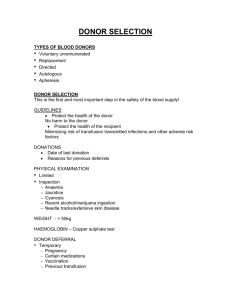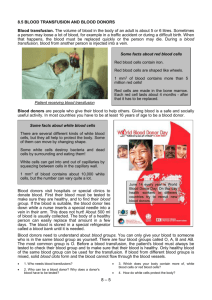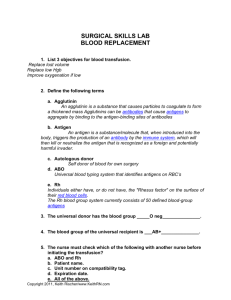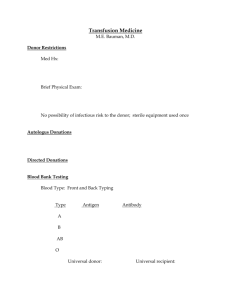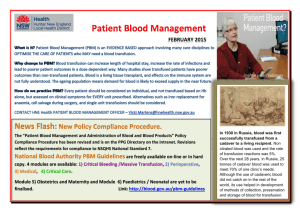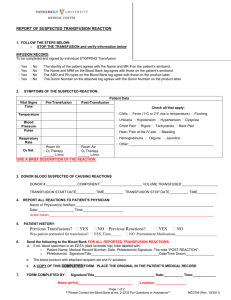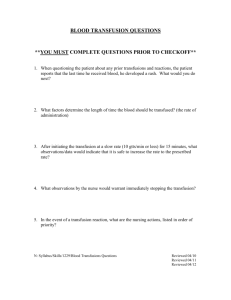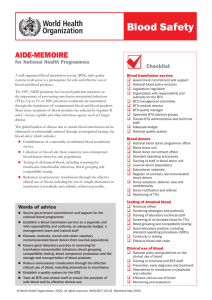rtf - British Antarctic Survey
advertisement
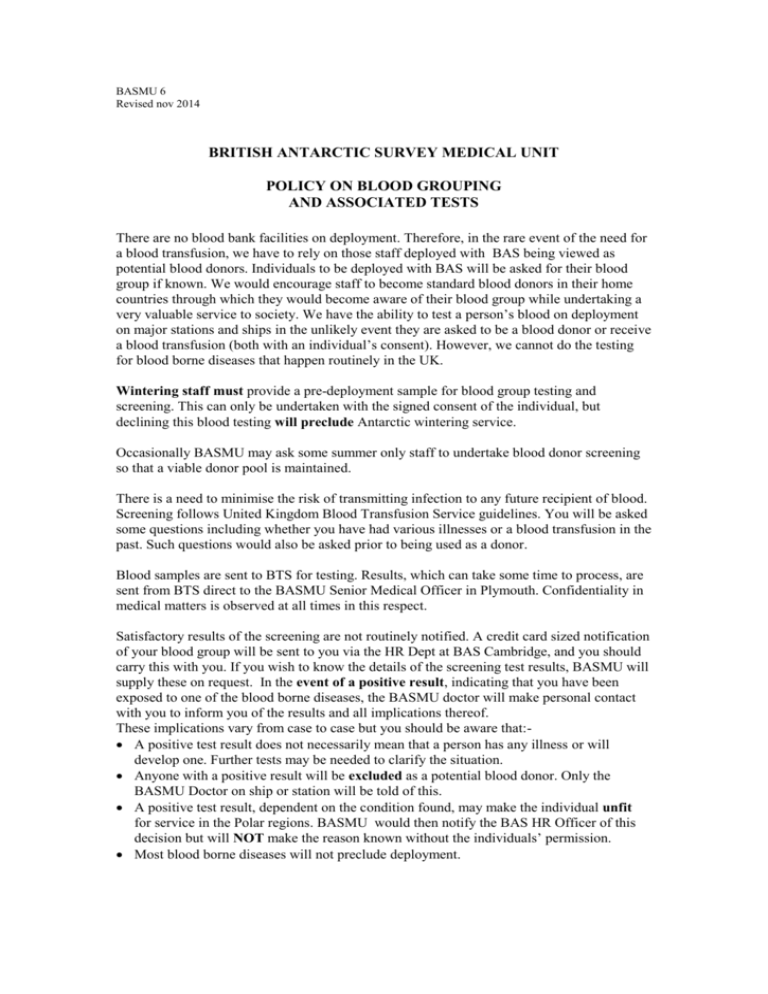
BASMU 6 Revised nov 2014 BRITISH ANTARCTIC SURVEY MEDICAL UNIT POLICY ON BLOOD GROUPING AND ASSOCIATED TESTS There are no blood bank facilities on deployment. Therefore, in the rare event of the need for a blood transfusion, we have to rely on those staff deployed with BAS being viewed as potential blood donors. Individuals to be deployed with BAS will be asked for their blood group if known. We would encourage staff to become standard blood donors in their home countries through which they would become aware of their blood group while undertaking a very valuable service to society. We have the ability to test a person’s blood on deployment on major stations and ships in the unlikely event they are asked to be a blood donor or receive a blood transfusion (both with an individual’s consent). However, we cannot do the testing for blood borne diseases that happen routinely in the UK. Wintering staff must provide a pre-deployment sample for blood group testing and screening. This can only be undertaken with the signed consent of the individual, but declining this blood testing will preclude Antarctic wintering service. Occasionally BASMU may ask some summer only staff to undertake blood donor screening so that a viable donor pool is maintained. There is a need to minimise the risk of transmitting infection to any future recipient of blood. Screening follows United Kingdom Blood Transfusion Service guidelines. You will be asked some questions including whether you have had various illnesses or a blood transfusion in the past. Such questions would also be asked prior to being used as a donor. Blood samples are sent to BTS for testing. Results, which can take some time to process, are sent from BTS direct to the BASMU Senior Medical Officer in Plymouth. Confidentiality in medical matters is observed at all times in this respect. Satisfactory results of the screening are not routinely notified. A credit card sized notification of your blood group will be sent to you via the HR Dept at BAS Cambridge, and you should carry this with you. If you wish to know the details of the screening test results, BASMU will supply these on request. In the event of a positive result, indicating that you have been exposed to one of the blood borne diseases, the BASMU doctor will make personal contact with you to inform you of the results and all implications thereof. These implications vary from case to case but you should be aware that: A positive test result does not necessarily mean that a person has any illness or will develop one. Further tests may be needed to clarify the situation. Anyone with a positive result will be excluded as a potential blood donor. Only the BASMU Doctor on ship or station will be told of this. A positive test result, dependent on the condition found, may make the individual unfit for service in the Polar regions. BASMU would then notify the BAS HR Officer of this decision but will NOT make the reason known without the individuals’ permission. Most blood borne diseases will not preclude deployment. Background information on blood grouping and associated testing if required. Before departure and with your signed consent your blood sample will be tested for the following: Hepatitis A and C - two forms of a viral infection that may damage the liver. The infection can cause jaundice and serious illness, but may be so mild as to pass unnoticed. The virus remains in the liver and blood for a long time after the illness has resolved and may be passed to someone else via a transfusion. Syphilis - this is usually a sexually transmitted infection which can be passed to someone who received blood from an infected donor. Human Immunodeficiency Viruses (HIV) - these viruses can cause Acquired Immune Deficiency Syndrome (AIDS). Having blood which is positive for the laboratory HIV test means AIDS might develop in the future. HIV positive blood can not be used as donor blood as the recipients would be likely to become infected. Due to the potential risk of transmitting CJD (human form of mad cow disease), we would normally avoid using donor blood from anyone who has received blood since 1st Jan’1980. Instructions for sampling etc. Sample tubes are supplied by BAS in accordance with local Blood Transfusion Service requirements. After taking the requisite amount of blood, the TUBES AND FORM must be labelled with Four unique identifiers. All details must be hand-written on the sample. Pre-printed labels must not be used on the samples but may be used on the request form. These identifiers are : 1. FORENAME 2. SURNAME 3. DATE of BIRTH, 4. FIRSTLINE OF ADDRESS and POST/ZIP CODE. Samples incompletely labelled will be rejected by BTS. This will mean that a further sample will have to be obtained. Please take care to complete all forms and tubes correctly to the required standard. BASMU 6 Consent ext’ For BTS use only BRITISH ANTARCTIC SURVEY MEDICAL UNIT CONSENT FOR BLOOD GROUPING AND ASSOCIATED TESTS Please read notes on “Policy on Blood Grouping and Associated Tests” Complete all the shaded boxes and please ensure that you sign your consent at the foot of this page. SURNAME_____________________________________________ Date of Birth ___ /______/_______ day month year FORENAMES___________________________________________ FIRST LINE OF HOME ADDRESS_________________________________________________________ POST / ZIP CODE____________________ HAVE YOU PREVIOUSLY HAD BLOOD TESTED BY BAS AT ANY TIME? YES / NO CIRCLE IF YES , INDICATE BLOOD TRANSFUSION SERVICE REFERENCE NUMBER HERE , IF KNOWN ______________________ HAVE YOU HAD A BLOOD TRANSFUSION SINCE 1st January1980? YES / NO CIRCLE CONSENT I hereby consent for a sample of my blood to be taken for blood grouping and associated testing. I have read the document “ British Antarctic Survey Medical Unit Policy on blood grouping and associated tests”. I understand that these tests are Hepatitis B and C , Syphilis and Human Immunodeficiency Virus (HIV) and I agree that the results of these tests are sent to the British Antarctic Survey Senior Medical Officer. Signed……………………………………… Dated…………………………………………

